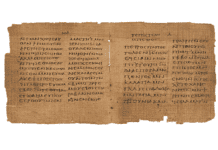She wasn’t trained as an art historian. Her degree from Oxford was in English literature. How did she develop an interest in art?
She had contributed income to the monastery by undertaking Latin translations and then asked to look at art books. She didn’t consider herself a scholar, just a remarkably empathetic responder to art. She began writing articles on art and then a book on women artists, and it got to the attention of the BBC. It’s an extraordinary story of being discovered in a most unlikely way.
Sister Wendy didn’t care for our modern indulgence with self knowledge. She disdained spiritual directors and hated the Enneagram. Why?
She had this idea that she didn’t have a self, that her own story was not important and that she lived completely in the presence of God and did not look backward. But in the course of her correspondence she really did begin to look back at her life to see patterns that led her to a very unusual calling to solitude as a hermit. In our correspondence, she was surprised to find herself looking back at the patterns in her life, of all of the ways she’d felt like a misfit, or an ugly duckling in a pond. In the past this had discouraged her from sharing about herself because she thought other people couldn’t understand her.
She didn’t take sin very seriously. Explain how she thought of it.
She believed actual sin was rarer than we suppose. She was very forgiving of people’s foibles and flaws as long as they continued to want to be with God and wanted to be more loving. She felt that was what God pays attention to. She felt the sacrament of reconciliation or confession was a wonderful thing. It’s not about listing the bad things we did but acknowledging our failure to love. In doing that, God’s love fills that space. It was consistent with her belief that we place too much emphasis on sin rather than on the overwhelming mercy of God.
Her views on gender seem absolutely radical given her orthodox Christian beliefs. She seemed to think gender wasn’t important. That’s really amazing.
I think she felt we were only beginning to understand this great mystery and that there was a spectrum in sexual orientations. She said she never had sexual feelings. For her, the life of celibacy was not a sacrifice. But she was not prudish about sexuality or the human body. It was all part of God’s creation. She didn’t see any difference between men and women. We’re attracted to people based on their intelligence, their humor, their kindness. She didn’t see how gender entered into it.
How did she choose to die?
She had a certain anticipation and happiness. She had pulmonary fibrosis – a hardening of the lungs — and she suffered a great deal physically, but even that she felt was a gift because it allowed her to identify with the cross of Jesus, which she felt could not be separated from the resurrection. She had frequent heart attacks. She had accidents where she fell. She had coughing fits. It was quite clear she was on a downward trajectory. Eventually, she realized she did not want to be a burden on the sisters and accepted going into hospice.
It was very moving to me to think that all her letters were “written” in her very precious breath that was expended with such effort. In her last message, which she sent not just to me but to other friends, she said, “When the day comes I want you to turn to God with great thankfulness for all that he has given me. This is the time of the deepest joy.” To this, she added a characteristic P.S.: “How embarrassing it will be and depressing if the Lord works a miracle, and I don’t die after all.”
This article originally appeared here.











